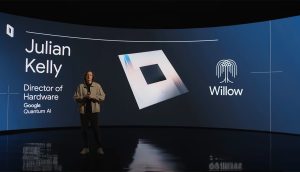Google quantum chip finishes tasks in minutes that could take 10 septillion years

Google has unveiled Willow, a next-generation quantum computing chip that it claims can complete a benchmark task in minutes that would require 10 septillion years with a conventional supercomputer.
The time needed for the classical approach to random circuit sampling (an industry standard for quantum computing challenges) “vastly exceeds the age of the Universe,” according to Google Quantum AI lead Harmut Neven.
The breakthrough comes largely through Willow’s approach to error correction. Where existing quantum computers tend to produce more errors as you add qubits (quantum bits) and grow in complexity, Willow reduces those mistakes as the system gets larger. Its 105-qubit array lasts longer than the individual bits, Google says.
While tests don’t necessarily translate to real-world results, Neven adds that Google is using “conservative assumptions” that would give traditional supercomputers the best possible conditions, such as full bandwidth for secondary storage.
What’s next for Google’s Willow and quantum computing?Google is clear about the goals for the Willow era of quantum chips: it wants to develop “real-world” uses that aren’t practical for conventional computers. Random circuit sampling doesn’t have known uses, and simulations of quantum systems have led to breakthroughs but are still achievable through familiar methods.
This could take a long while. Willow helps Google cross a second milestone in its roadmap, where error correction becomes viable. However, it still needs to make long-lived logical qubits and a logical gate. It also has to scale the engineering for the task and, ultimately, make a large quantum computer with that error correction in place. That’s going to require larger qubit counts and other processes that are still distant, even with the help of partners like Nvidia.
For Google, though, there’s a strong incentive to keep moving forward. Quantum computing could be the key to truly advanced AI by collecting training data and producing models that just aren’t possible today. The company casts this as useful for discovering new medicines and energy technologies, but it could also be useful for artificial general intelligence (AGI) in robots that need to understand virtually everything about the world around them.
The post Google quantum chip finishes tasks in minutes that could take 10 septillion years appeared first on ReadWrite.
